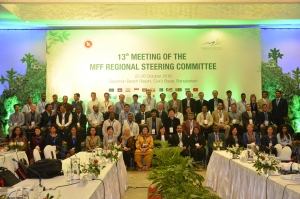Newsroom :: News :: Mangroves for the Future holds 13th Regional Steering Committee meeting in Bangladesh
Mangroves for the Future holds 13th Regional Steering Committee meeting in Bangladesh
Location: Cox's Bazar, Bangladesh. 26th Oct 2016
During the meeting, participants reaffirmed the vital role of MFF in assisting member countries to strengthen their capacity for implementing sound marine and coastal ecosystem management policies. They also highlighted the impact of technical assistance and training provided by the programme, as a basis for better policy decision-making.
The Steering Committee acknowledged the significant progress made by Mangroves for the Future and approved the work programme for 2017. Development partners discussed strategic priorities and expectations on the programme’s sustainability beyond 2018 when the current donor funding comes to an end. To strengthen MFF’s outreach activities, the Committee recommended that the programme collaborate with other regional bodies whose focus areas are in line with MFF objectives.
Regional Steering Committee members also stressed the need to maintain National Coordinating Bodies (NCBs) to oversee implementation, and to ensure that lessons learned from project interventions are duly captured and applied, in order to strengthen the sustainable management of coastal resources.
On the programme’s priorities for the coming year, Regional Programme Coordinator, Dr. Steen Christensen said, “The programme will place emphasis on enhancing members’ capacity to integrate private sector engagement strategies into their national programmes. The private sector, especially the tourism and fisheries industries, are important stakeholders. The sustainable management of coastal resources can only be achieved if these stakeholders are engaged and become active partners in the management process.”
The meeting also highlighted the Green Climate Fund (GCF), a fund within the framework of the United Nations Framework Convention on Climate Change (UNFCCC), as a promising avenue for funding of a programme that builds on the structure and initiatives developed by MFF. The MFF regional secretariat is currently in consultation with several countries, and working to identify priorities to support the programme’s proposal to the fund.
“Although the new programme will cover new areas, it is important to ensure that it builds on the principles and lessons learned from MFF, such as its governance structure, grant modalities, partnership-based focus and, most importantly, country ownership. These are factors that have clearly contributed to the long-term success of MFF,” said IUCN Asia Regional Director, Ms. Aban Marker Kabraji.
The meeting also saw the endorsement of the ASEAN Centre for Biodiversity (ACB), regarded as an international centre of excellence for biodiversity conservation, as an MFF institutional partner. IUCN and ACB had earlier signed a Memorandum of Understanding (MoU) committing the two institutions to collaborate on initiatives that support biodiversity conservation objectives. The MoU also identifies collaboration with MFF on programmatic issues as a top priority.
Back to back with the Regional Steering Committee meeting, the MFF regional secretariat hosted a workshop on ‘Social Empowerment’. The session explored and documented examples where MFF and its partners have been successful in strengthening social empowerment in communities. Through group discussions, participants debated approaches, practices, lessons learned and challenges in order to identify potential best practices that can be used to enact socially supportive and environmentally sustainable results, and to inspire participants to consider the benefits of social empowerment.
“We need to keep in mind country level context, and to what extent MFF processes identify social empowerment as an objective. We have to monitor what we are doing in practice so that we know what we can improve on to mainstream social empowerment into the programme,” said MFF Capacity Development Manager, Ms. Maeve Nightingale, in her summary following group discussions.

Group photo at the 13th Meeting of the MFF Regional Steering ... © © Akash Muntasir/IUCN Bangladesh